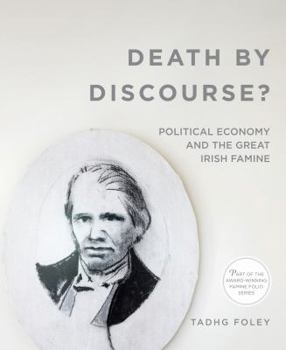Death by Discourse?
The most virulent and rancorous debate during the Great Irish Famine concerned the role of the state in economic affairs, with the science of political economy, the authoritative official discourse, decreeing a policy of laissez-faire. Long regarded as either ignorant or neglectful of its principles, the Irish, from the 1830s, were the focus of systematic economic evangelism.
During the Famine, officialdom and its powerful institutional allies defended the laws of political economy then under unrelenting popular attack. According to one authority the providing food for sale in all districts, and under all circumstances, should be left to the foresight and enterprise of private merchants. The laws of commerce were the laws of God and demanded unswerving obedience. But others argued, overwhelmingly in moral terms, that in the cataclysmic Irish circumstances these laws should be either modified or even completely disregarded, maintaining, like Bishop Hughes of New York, that the rights of life are dearer and higher than those of property.
Ireland was seen as economically backward, being over-populated, lacking industry, and being almost totally dependent on a grossly inefficient agricultural sector. The modernization of Irish agriculture entailed the substitution of capitalist farming for the cottier system, resulting in the consolidation of small farms into larger holdings and the general replacement of tillage with pasture. The ultimate cause of the Famine was held to be not so much the palpable economic state of Ireland but the more mediated and intangible agency of Irish character, the cause rather than the effect of poverty. Irish character, lacking steadiness, prudence, and foresight, needed externally-imposed discipline, the character-forming rigor of competition in free markets with the central discursive role being taken by political economy.
Ireland's Great Hunger Museum at Quinnipiac University publishes Famine Folios, a unique resource for students, scholars and researchers, as well as general readers, covering many aspects of the Famine in Ireland from 1845-1852 - the worst demographic catastrophe of nineteenth-century Europe. The essays are interdisciplinary in nature, and make available new research in Famine studies by internationally established scholars in history, art history, cultural theory, philosophy, media history, political economy, literature and music.
During the Famine, officialdom and its powerful institutional allies defended the laws of political economy then under unrelenting popular attack. According to one authority the providing food for sale in all districts, and under all circumstances, should be left to the foresight and enterprise of private merchants. The laws of commerce were the laws of God and demanded unswerving obedience. But others argued, overwhelmingly in moral terms, that in the cataclysmic Irish circumstances these laws should be either modified or even completely disregarded, maintaining, like Bishop Hughes of New York, that the rights of life are dearer and higher than those of property.
Ireland was seen as economically backward, being over-populated, lacking industry, and being almost totally dependent on a grossly inefficient agricultural sector. The modernization of Irish agriculture entailed the substitution of capitalist farming for the cottier system, resulting in the consolidation of small farms into larger holdings and the general replacement of tillage with pasture. The ultimate cause of the Famine was held to be not so much the palpable economic state of Ireland but the more mediated and intangible agency of Irish character, the cause rather than the effect of poverty. Irish character, lacking steadiness, prudence, and foresight, needed externally-imposed discipline, the character-forming rigor of competition in free markets with the central discursive role being taken by political economy.
Ireland's Great Hunger Museum at Quinnipiac University publishes Famine Folios, a unique resource for students, scholars and researchers, as well as general readers, covering many aspects of the Famine in Ireland from 1845-1852 - the worst demographic catastrophe of nineteenth-century Europe. The essays are interdisciplinary in nature, and make available new research in Famine studies by internationally established scholars in history, art history, cultural theory, philosophy, media history, political economy, literature and music.
Format:Paperback
Language:English
ISBN:0997837411
ISBN13:9780997837414
Release Date:November 2016
Publisher:Cork University Press
Length:40 Pages
Weight:0.65 lbs.
Dimensions:0.2" x 8.9" x 10.8"
Related Subjects
HistoryCustomer Reviews
0 rating





